Do you know what they know? Challenges in a data driven world.
Kacper doesn’t have a Facebook or WhatsApp account as he doesn’t agree with their data sharing policies…
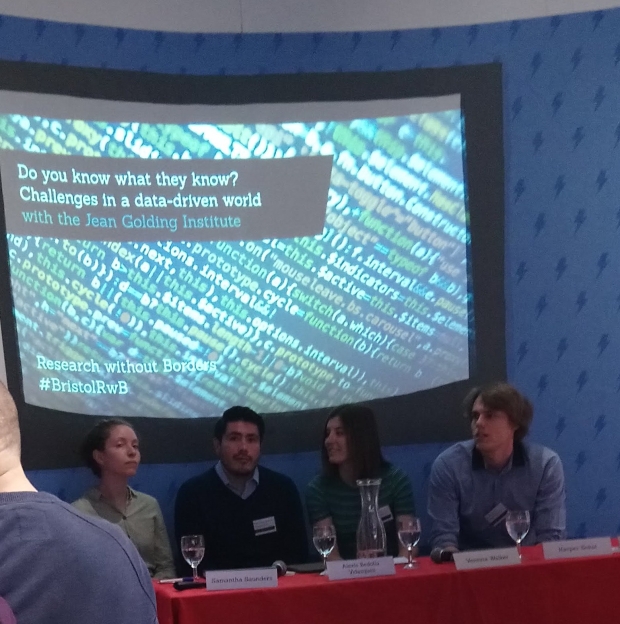
Do you know what they know? Challenges in a data driven world.
Kacper doesn’t have a Facebook or WhatsApp account as he doesn’t agree with their data sharing policies…

I recently travelled to Reading (like a proper adult on the 7am commuter train) for the second Nutrition Society Student Conference. (Last year it was in Chester – Last years blog)
This year I had entered my abstract and been accepted to present my final year research project in a lightening session. These are quick 2 minute presentations! with a minute for questions.
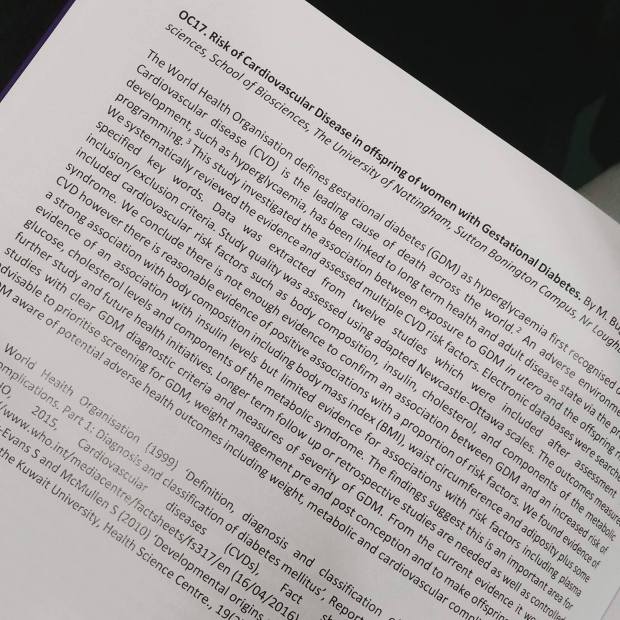
^ My abstract in the conference programme.
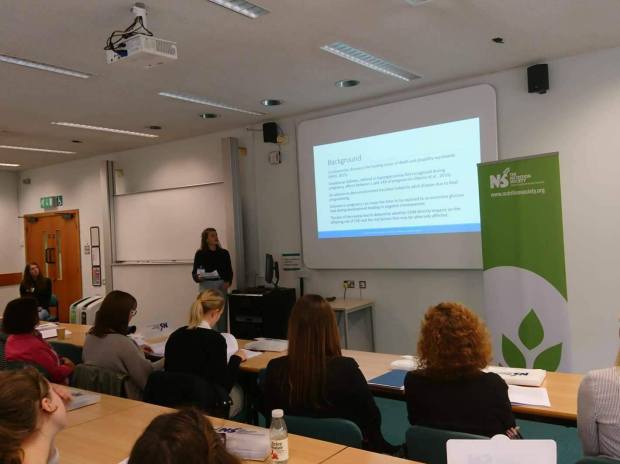
I was nervous about presenting (it’s still a skill I am developing – I ) and I relied too much on my notes but I can just keep trying to improve and build my confidence in front of an audience.
It was a busy day filled with interesting talks and lots of student presentations so we got to hear about a wide variety of great nutrition topics and research.
My project was a systematic review looking at risk of cardiovascular disease in offspring of women with gestational diabetes. I included 12 studies in my review. I enjoyed the logical process to completing my study. I found links with certain cardiovascular risk factors in the studies but overall I couldn’t conclude a clear link.
No doubt i’ll be at another nutrition event soon. But for now it’s time to start work!
So, I’ve finished my degree!! and graduated!! woooo!!
It’s been a journey.
I’ve learnt a lot.
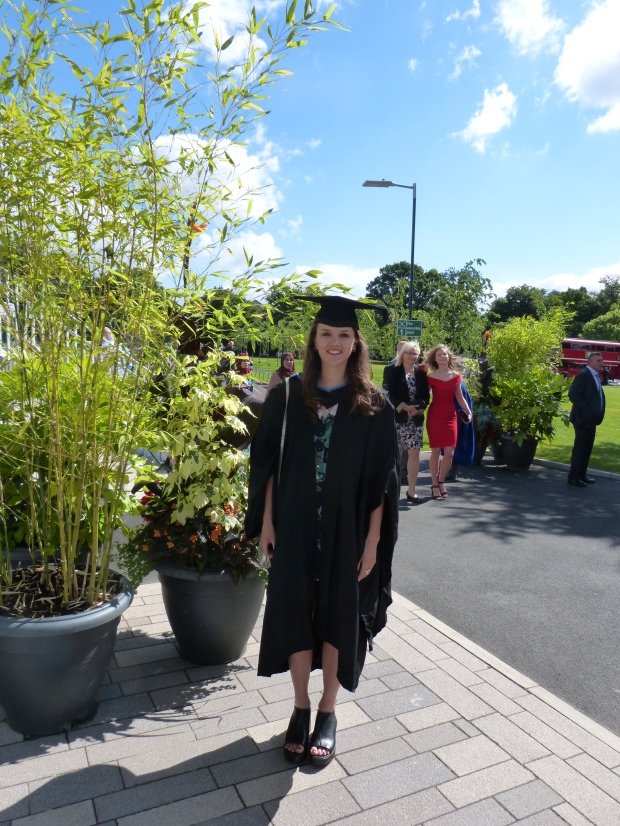
Now I’ve got to go into ‘real life’ and I’m ready!
I’m nervous because education gives structure and it’s always been part of my life but I’m ready to explore. I want and need to get out into the real world. I am grateful for my education and I am proud of myself for working so so so hard. Now I’m ready to transfer my passion into making a difference.
I’m excited for the future of food.
I think it’s important to rebuild our food communities. Eaters, growers, buyers, sellers. By creating an understanding of food an increase in nutrition will come.
I want to get out into the community and help make a difference there. I also want to gain more knowledge and experience of public health. I want to try and use my knowledge and passion to make a difference to peoples lives.
I had a lovely day celebrating at graduation (which i’d be waiting for the day to arrive for a loooooong time), I’ve said good bye to Nottingham and for now I’m searching and applying for jobs and going for interviews …
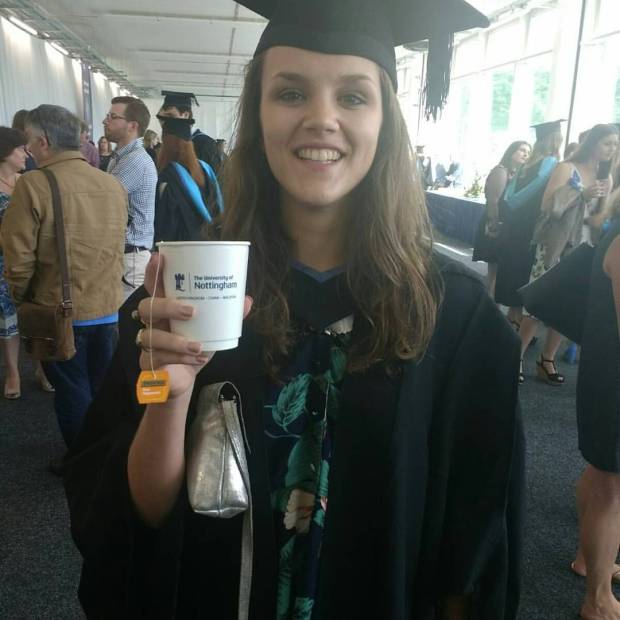
These post are rather late due to deadlines, exams and research projects giving me no extra time! But this is the first of a few about the seminars I went to at Food Matters Live a few weeks (months now) ago. (See previous post)
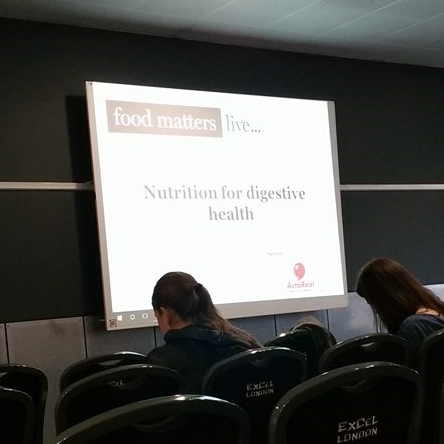
Digestive health is an extremely interesting topic. The gut microbiota is so complex and there are diet-microbiota interactions and also brain gut connections! Digestive illnesses are very common and it is an area that researchers are still learning about.
What is next for Nutrition and digestive health?
The first talk ‘Market insight and trends for gut health ingredients shaping the digestive health market’ was presented by Ewa Hudson, Global head of health and wellness, Nutrition and ethical labels, Euromonitor international. She dicussed the growth and innovation of the growing digestive health sector.
Here’s what I learnt: Digestive health is the 3rd largest health trend within the health and wellness industry! It has shown to be equally important across key regions of the world. The top products are FF bottled water, probiotic yoghurt, high fibre breakfast cereal and sour milk drinks. Others include noodles, bread, pasta and biscuits. The top digestive health brand in the world is Yakult and then Activia. In Western Europe sales of probiotic supplements outpase sour milk drinks currently. The gap between sales of probiotic yoghurt and supplements is narrowing – supplement sales are increasing. Probiotic supplements currently have a retail value of $4 billion (2015) and growth is expected. In 2016 there was £10.5 billion worth of digestive remedies sales – including indigestion and heartburn remedies, laxatives, diarroheal remedies and IBS remedy etc. This was highlighted to show a need for improved preventative approach. Digestive diseases in the UK cause 49 deaths per 100000 people – this is quite high. In the UK Weetabix is the largest selling digestive health brand! (Most people would probably think it would be a yoghurt brand). Then it is oat so simple, Warburtons, Kingsmill, Hovis, Shreddies, Kellogs, Alpen, Dorset cereals. Think fibre! Weetabix don’t only focus on their fibre and wholegrain aspect of their products but also local production and responsible growing of their wheat with less fertiliser. It is thought that there is lots of opportunity in China for digestive health products. Looking into the future – food and mental disorders are on the rise and so are allergies, skin conditions, arthritis and autism – thinking about the gut as the second brain. As well as food and mood links involving the gut and brain axis. We are now more intuned with our bodies and adjusting diets. There has been a big rise in free from foods – likely to be the fastest growing health and wellness trend in the next 5 years. Free from in 2016 was worth £21 million globally and involves improving digestion as it includes many products free from dairy (big category), gluten, lactose. Finally, clean labels were discussed as a new idea for digestive health products.
The second speaker was Dr Megan Rossi a Research Associate at Kings College London. Next post to come will be information from her talk about IBS and FODMAPs…
Last week I headed on an early train Nottingham to St Pancras for a day at Food Matters Live – a huge UK food and nutrition conference which brings together industry, retailers, government and those working in nutrition for a 3 day event. There is a huge exhibition of organisations including food companies to universities; lots of speakers participating in seminars; plus networking opportunities with the range of visitors from backgrounds including food science manufacturing, R&D, marketing, retail, nutrition and public health. I had been before and I was looking forward to it!
I first went to a seminar session on digestive health: ‘What is next for nutrition and digestive health?’ – a very interesting and relevant area. Dr Glenys Jones, the communications manager at the Association for Nutrition chaired the session and introduced the varied speakers. The first speaker was Eva Hudson, Global Head of Health and Wellness Rseaearch at Euromonitor International – she spoke about market insight and trends for gut health ingredients shaping the digestive health market which I found very interesting (clue – weetabix is the biggest selling digestive health product in the UK!). The second talk was Understanding the FODMAP concept presented by Dr Megan Rossi, She is a Research Associate at Kings College London. Her talk was great and very informative and well explained (it added to my own reading I have been doing on this topic). Professor Bob Rastall, professor of food Biotechnology at The University of Reading presented about the Latest insights into the effect of food and diet on gut microbiome. This involved some complex gut biochemistry pathways! The session was then finished by Dr Gwen Falony, scientist at VIB who explained some population-level analysis of gut microbiome and the studies they have been doing with fecal samples. More detail about the information from the talks to come in my next blog posts!

The second session I went to was about early years (an area of nutrition I love – my research project is about maternal nutrition – and a very important one to prevent problems later in life). ‘Maternal and infant nutrition: supporting good nutrition in early years’. This session was chaired by Professor Sarah Redsell, Professor of Public Health at Anglia Ruskin University and she introduced with Identifying obesity risk in infancy: the role of the health visitor. First Kim Roberts the Chief Executive on HENRY (Health, Exercise, Nutrition for the Really Young – what a great charity!) spoke about Making every contact count: working with health professionals to ensure families are given effective nutritional advice. Vicki Watson a specialist Public Health Dietitian from Nottingham City Care Partnership spoke about weaning ways: how to give families the best possible advice and support around complimentary feeding. She spoke about some of the great work that has been put into the communities here in Nottingham! Then the best practice in infant weaning was dicussed. Clare Basely, Registered Nutrition, CLB Nutrition Ltd and Ella’s Kitchen also spoke about weaning and she presented Improving babies’ long term food preferences by weaning with vegetables: a review of the latest evidence. (Use vegetables in weaning!). Katie Fordham (ANutr), the science and innovation senior manager at Danone Nutricia Early Life Nutrition thenexplained taste and texture in infant weaning: How weaning practice impacts on later eating habits. To finish Annie Denny the Nutrition Development Manager at the Early Years Nutrition Partnership spoke about delivering expert food and nutrition practice in early years settings. (A great job that the EYNP do) – Again more details to come in a future blog!
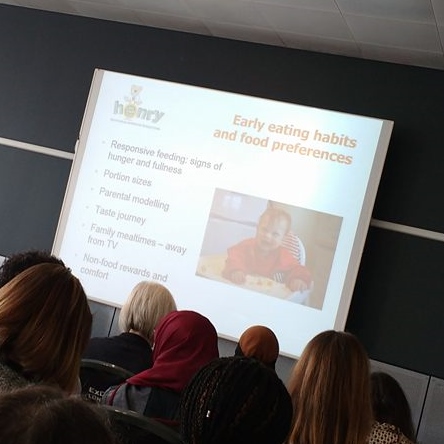
I then took my time walking around the exhibition (and trying many a sample of the products on show!). The exhibitors ranged from big food and drink manufacturers to new small start ups plus Universities and research bodies, retailers, ingredient suppliers and food service providers – all showing developments in food and drink innovation in ‘healthier’ ideas.
There was many a gluten/dairy free, vegetarian/vegan, ‘refined sugar free’ type of fruit/nut/seed bar this year …
In the afternoon I decided to go to some sessions in the conference theatre. Firstly ‘Food and Youth Matters’ where Prof. John Stein – Professor of Physiology at University of Oxford; Prof. Deborah Christie – Consultant clinical psychologist and Professor in paediatric and adolescent psychology; Emma Woolf – Author, writer, critic and journalist; and Marcus Butler – You Tube vlogger all pitched their views and then took part in a discussion with lots of questions from the audience.
I then stayed for the next conference session which was ‘The psychology of food choice: what shapes our food preferences’ (interestingly linked to my current ‘changing behaviours, promoting health module at uni’). Bee Wilson – Food writer and historian; Pierre Chandon – Director at INSEAD Sorbonne Behavioural Lab; Daniel Glaser – Neuroscientist and Director of Science Gallery, KCL; and Dr Rob Post – Senior Director of the Chobani Nutrition Center all shared their thoughts and opinions before answering questions from the audience and discussing their different view points.
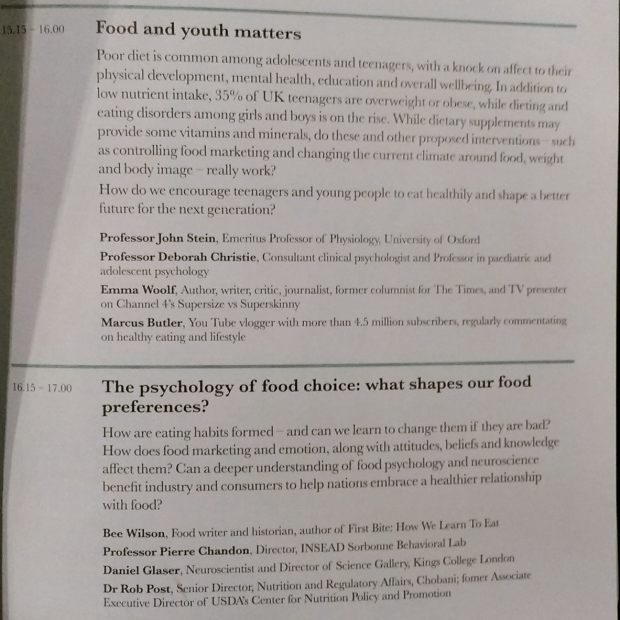
A busy but great day in the nutrition world! I love going to conferences as I get to hear new and exciting things happening in nutrition, potential career areas and learn new things. It reinforces why I am so passionate about nutrition.
More blog posts to come with more about what was talked about in the presentations/discussions.
Waiting in kings cross for my train home meant for a Leon meal for dinner as a hot nourishing meal was what I needed to sustain my journey back. Food on the go doesn’t have to be unhealthy!
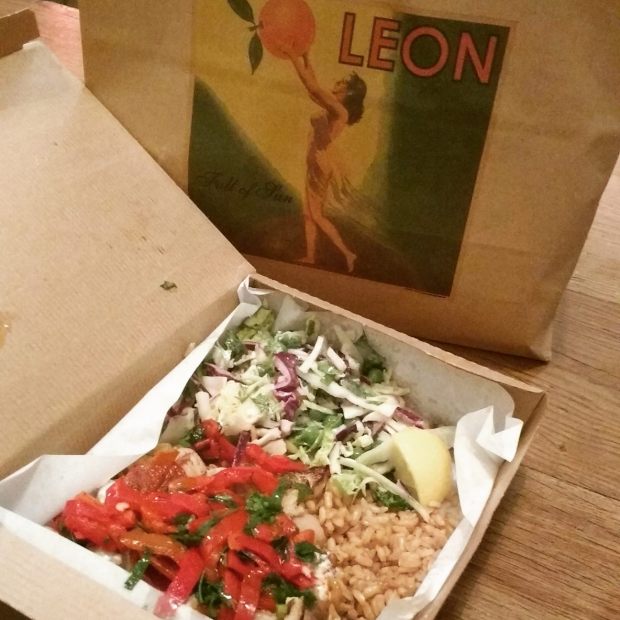
This term I am taking a module called coordinated physiological functions. It is actually based in the department of animal science so there is a variety of students on the module.
We will be looking at a variety of connected functions and behaviours and be focusing on the role of the hypothalamus and inter-connections with the nervous and endocrine systems. This is a key link between physiological function and behaviour.
‘The neural circuitry has a key role in providing central drive to the physiological changes underlying physical exercise. Increased activity has to be matched by alterations in cardiovascular and respiratory effort to meet the increase in metabolic demand.’ This is the description on our module handbook and introduces the area that we are currently looking at in our lab sessions.
In our labs we are comparing exercise economy according to predicted VO2max. We will look at the null hypothesis: fitness doesn’t predict exercise economy.
Exercise economy the energy cost of exercise at a particular work rate. Exercise economy can predict performance in aerobic events.
VO2max is oxygen consumption at maximal work rate. Fitness is characterised by VO2 max.
So basically we are going to see if fitness levels link to performance levels in the way we would expect. Using ourselves as subjects!
This is the equipment we will be using linked up to a computer.
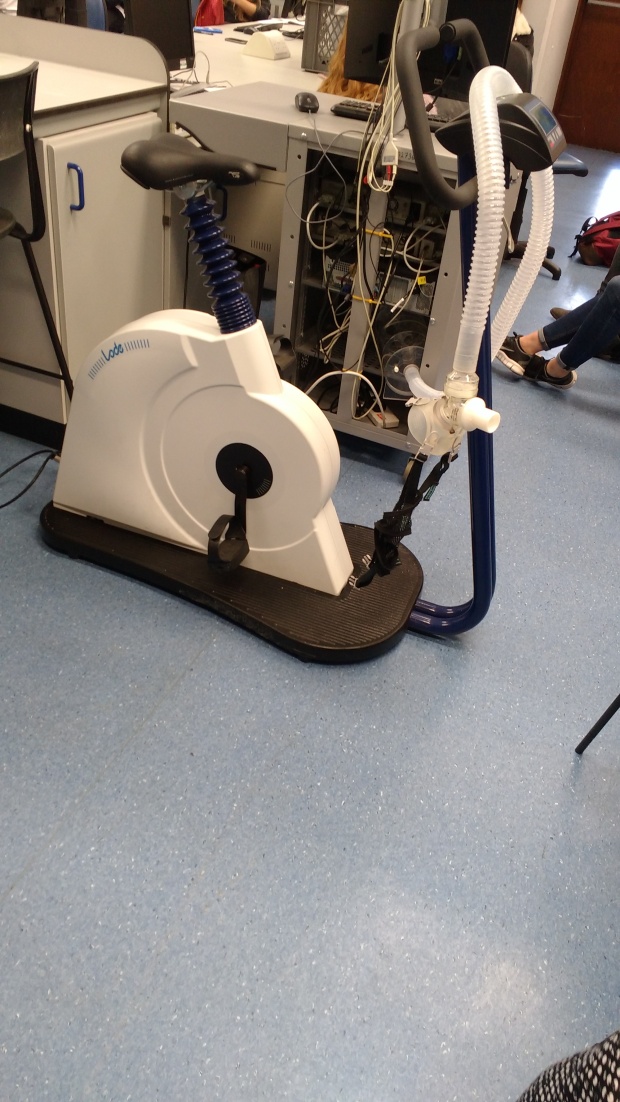
We initially walked for a mile timed it and measured our heart rate after and then ran for a mile and timed it. We used these numbers and our weight and height to estimate our VO2max using an equation. We also predicted it using another equation based on non exercise data – using an exercise questionnaire and our BMI.
The next task is to predict our VO2max at sub-maximal work. So we will use the bikes to exercise to 75% of our VO2max and find the workload for each induvidual. Then we will use this to reate 4 workloads and then exercise for 3 minutes at each workload and record O2 consumption, heart rate and respiratory exchange ratio in order to predict VO2max.
Finally we will determine exercise economy by exercising for a short duration and measuring oxygen volume consumed. Subjects that consume less oxygen will be consumed by subjects that perform better.
Once we do all this we have to write up a group report of the findings.
Just shows how varied studying nutrition is!
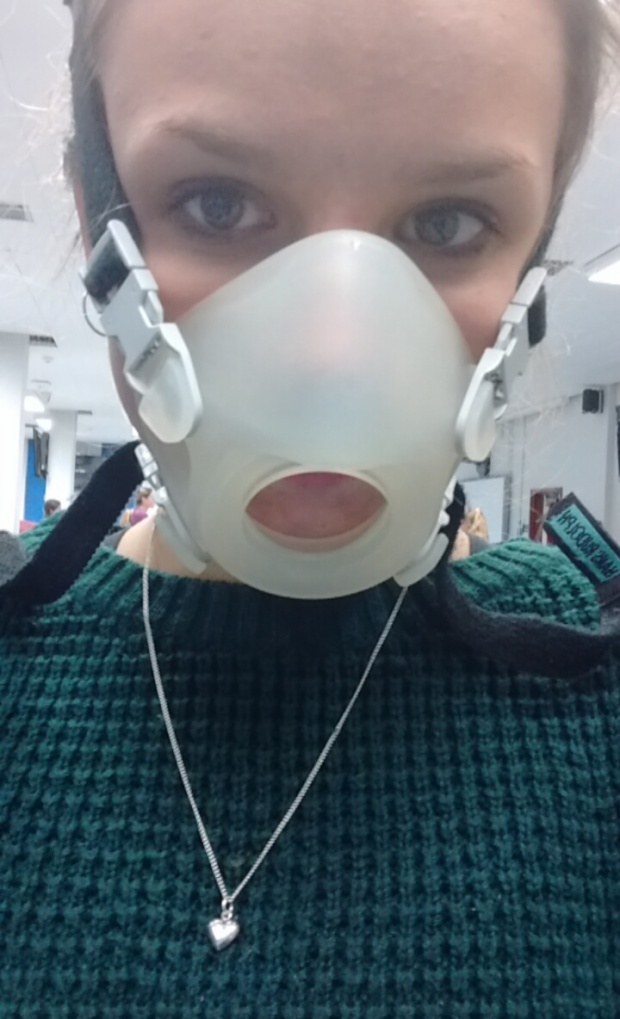
Trying on the mask before I was linked up to the breathing equipment! It has to be completely tight so that all gas exchanged can be measured through the tube the mask is attached to.
Slightly different to the nutrition related conferences I have been too recently but another very important area of our well being!
Last week I attended the RAMHHE conference. Raising awareness of mental health in higher education is a campaign to raise awareness of mental health in Higher Education. It was founded by Josephine Nwaamaka Bardi who is a PhD student from the nursing faculty. She is a part time lecturer in London and from working from students she learnt a lot about the large issue of mental health in higher education.
The objective is to ‘remove stigma around mental health in higher education and act as an inclusive forum for staff, students, mental health experts and service providers to discuss views and perceptions of mental health and recovery.’
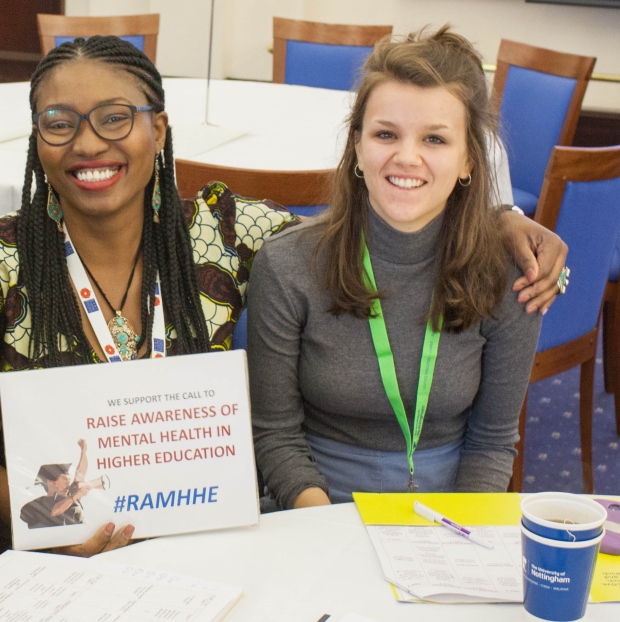
This was a fantastic first conference.
It started with 10 minutes of mindfullness for everyone to take part in.
Introduction presentations included facts and figures about mental health in students, welfare services that are in place in University departments and across the University as a whole. The rising distress of students and the pressures on students today were also discussed – including social media and the pressure to have ‘the best time of your life’.
‘We all have mental health’ – introductory talks asked the audience how many people actively think about looking after their mental health as they do their physical health.
There were then smaller discussion sessions. I joined one about stigma and loneliness which we had lots of discussions. There were a group of psychology students who had come from another university. We had a really interesting discussion about stigma and loneliness and where support is needed. Everyone made great contributions to the session. The other one I went to was about creativity. We had to make something out of a piece of paper to represent something in the arts or humanities that we used to or still do. I tried to make it into a picture like the art I did in school. Creativity is good for well being!!!!!!!!!! It reminded me how much I miss the creative things I used to do. I find it hard to find time to prioritise more creative hobbies when studying, uni work always comes first!
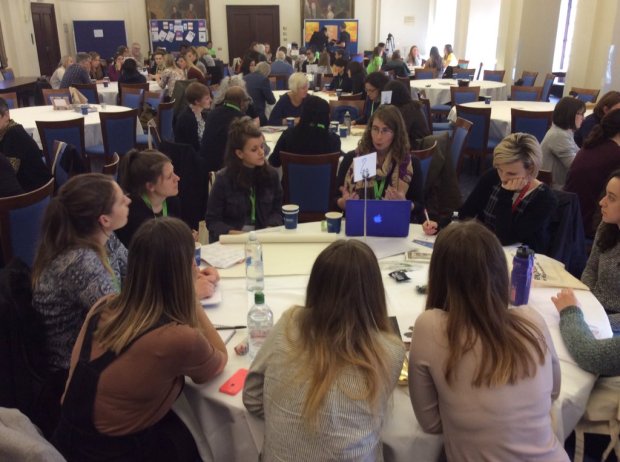
There was a fantastic hot lunch provided and a smoothie bike! (See Instagram)
There were stands including student minds, nightline, student advice centre, disabled students teams etc for people to go and talk to.
There were then more presentations including ‘The arts of recovery’ – the University professor who had run the earlier session gave a personal reflection on recovering from mental health issues and how he uses his creative practises. There was personal stories of mental health issues in higher education, an intense presentation about the ‘healing space’, lessons from around the world for better mental health and support in postgraduate settings.
The attendees of the conference were asked to give their feedback on the event and the topics discussed. This will be written up as part of the research and presented to help make positive differences to student well being in the future!
Read more about RAMHHE at ramhhe.org
In sixth form I studied Maths, Biology and Chemistry for A level and did AS art. I had always liked science and wanted to do something health related. I knew I didn’t want to do medicine but was interested in health and science and everything related to it. I didn’t how ever want to do a biology degree. I like biology but struggled with learning the volume of facts for exams. I liked the answers that maths had and working through a problem knowing it would be right or wrong. Chemistry was a kind of middle ground with more specific answers than biology in some ways and some more maths and calculations involved. I applied to university to study biological and medicinal chemistry – long name but essentially a mixture of core chemistry, biochemistry, some biology, and some medicinal chemistry. I’d read some books about drugs and their interactions with the body which I found interesting and I thought it could take me down the route of drug design possibly so still along the health line of science that I like.
To cut a long story short this course wasn’t the right one for me. I couldn’t relate to it and it was very theoretical science. So after a year it was time to find a new direction. I contemplated everything. Should I stay at uni? Should I get a job? Should I change course? What new course would I do?
This was the start of my journey to realise just how passionate about nutrition I am. I started on the joint Nutrition and Food science course which had the same first year modules and after that year I chose to continue with straight Nutrition as it is the human health side that really interests me as opposed to food chemistry and food manufacture. Nutrition is the gap that I wanted to study when I was in sixth form it was just a longer process to find it. But I have learnt a lot to getting to this point! (One of my mums favourite things to tell me at the moment is ‘life is a journey not a race’)
Nutrition combines science and human health. I feel like nutrition is that something I was looking for back in sixth form. I can relate it to real life which I love. I can apply the core science to health. I can see where nutrition fits into every day across the world and is only going to increase in the future. We study biochemistry, metabolism, diet in relation to disease, physiology, food science, human nutrition, animal nutrition, nutrition across the lifespan, public health nutrition, and nutrient gene interactions related to nutrition – just to name a few areas! I love it. I know this is the area I want to be in.
I have done work experience at cook and eat session with a nutritionist. I volunteer at a community meal where we provide a free vegetarian meal to the community in which many people are homeless, lonely and struggling with mental health. I have done a project with a windmill which mills flour to create information leaflets for them. There’s so so so much great nutrition and opportunities out there to make a difference.
So here I am now about to start my final year of my undergraduate degree. I’m about to start my research project in the area of maternal diet, dietary fat and cardiovascular disease. I’m asking all the questions all over again: what kind of job do I want? What careers are out there? Do I want to study more? Plus new questions: How can I get a clinical nutrition job? Should I do postgraduate dietetics? Can I afford further study? Do I want to work in industry? I want to work with people how do I do that? I would love to do dietetics, can I afford it? Should I apply now? Or work first? Which part of nutrition out of all the parts I love is a good area for jobs? What jobs can I do where I work with people?
I found out a lot during the Nutrition Society student conference (see other blogpost) so I need to start thinking, whilst also studying and starting applying. I also learnt a lot at the Association for the study of Obesity conference which I volunteered at. (blog to come)
I was told at a uni open day I was working at that I was the first person to sounds enthusiastic and passionate about nutrition she had spoken to at all the university’s she’d visited. My housemate used to laugh at me for always retweeting nutrition and food things and mentioning random facts. Hopefully I can continue this through my final year and interviews to the future of my nutrition.
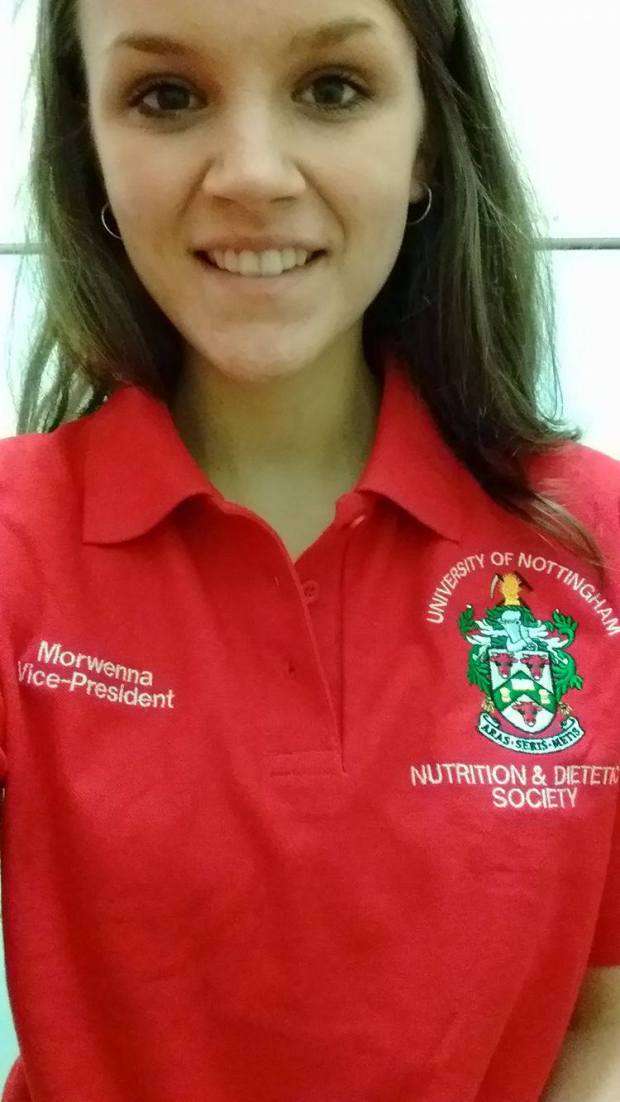
Last week in my society T shirt at freshers fair.
UKCO2016 19th-20th September 2016 Nottingham.
This year the ASO conference UKCO2016 was held on campus. I was lucky enough as a student to have the opportunity to volunteer to help. I really appreciated the opportunity and was able to listen to some of the presentations. I enjoyed tweeting from the conference too/retweeting everyone else’s interesting tweets.
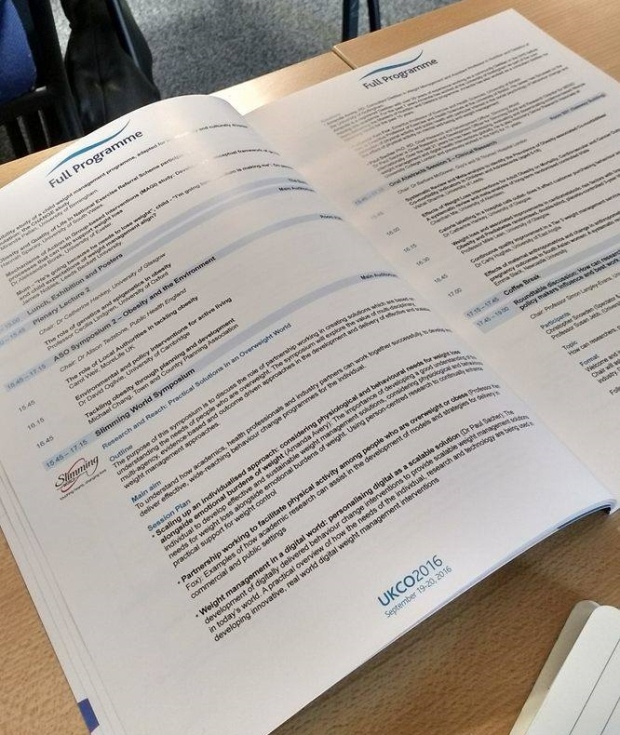
DAY ONE:
ASO Symposium 1 – Should we be adopting a less weight centred approach?
Dr Judy Swift from the University of Nottingham opened this session discussing the challenge of weight centred practise. The weight centred outcome of interest is BMI. There is an assumption that excess adiposity negatively affects health and weight loss results in health gains. She then continued to outline the criticisms of the weight centred approach.
Professor Paul Aveyard from the University of Oxford talked about the importance of weighing as an outcome and as a behaviour change tool. He is a professor of behavioural medicine. Risk decreases in proportion to kg lost. The number one trigger of weight loss is to improve appearance. More women are losing weight even if they are a healthy weight compared to men.
Dr Rachel Pryke from the Royal College of General Practictioners discussed the risks of weighing children and adults.
Yemi Oluboyede from Newcastle University presented Innovations in measurements: Quality of life and economic values.
Plenary lecture 2 – The role of genetics and epigenetics in obesity. Professor Cecilia Lindgren from the University of Oxford presented such an interesting talk on this topic. There was complicated science but a fascinating area.
ASO Symposium 2 – Obesity and the environment
Carol Weir from MoreLife UK spoke about the role of Local Authorities in tackling Obesity.
Dr David Ogilvie from the University of Cambridge presented the Environmental and policy interventions for active living. Changing driving for walking/cycling has been shown to decrease BMI. For a long time the focus has been on advice for individuals to take and active approach – there is potential to increase population level physical activity through the creation of things like cycle routes. The Cambridgeshire community bus plan and connect 2 were discussed and they sound very beneficial. It has been shown that cycle commuting has health benefits including higher mental wellbeing, decreased sickness absence and decreased BMI. I told my dad this as he regularly does his 25 mile journey to work on his bike and hopes he is a good example.
Michael Chang from the Town and Country Planning Association discussed tackling obesity through planning and development.
I enjoyed the symposium as it was based on a lot of topics I didn’t know much about and areas of nutrition related interventions I hadn’t really thought about before. Incorporating healthy lifestyles by making healthy choices easily accessible into day to day life is really important for a healthy population.
DAY TWO:
Infant and toddler forum Symposium – The Obesity challenge: Prevention is action
Judy More a Paediatric Dietician (what a great job) and member of the ITF. She spoke about nutritional guidance in early life being a key public health prevention strategy in order to improve the health of the next generation. Over 1 in 5 children are overweight! I found the link with fetal development and weight really interesting. Over weight mothers/gestational weight gain and endocrine changes in the placenta have been discussed in research. Lifestyle affects weight too from a young age and is influenced by things like screen time and sleep. Getting used to large portion sizes or being encouraged to eat a lot and being rewarded by food can also lead to over eating and therefore problems later in life. During pregnancy it’s important to focus on keeping physically active, choosing nutritious foods not extra foods and healthy weight gain. Letting toddlers respond to hunger cues is important and not forcing food. Plus as for everyone physical activity and enough sleep plays a role.
Dr Clare Llewellyn a lecturer in Behavioural Obesity Research at University College London discussed why portion size and relation to appetite and weight gain. Growth rate differs right from birth. Increased meal size causes a faster growth rate.
Melanie Pilcher is a Policy and Standards manager at Pre-schools Learning Alliance. She talked about the practical implementation of best practice guidance in early years settings.
I love this symposium. I really like the area of early years nutrition and I believe its such an important area in order for everyone to grow up with healthy attitudes towards food and health and can contribute to decreasing health issues later in life. I enjoyed hearing Melanie’s case studies as I love putting science into real life settings. My mum is a primary school teacher so packed lunches and school dinners are a big deal. The IFT have fantastic resources and lots of fact sheets.
Member led symposium 3 – A critical perspective on the use of BMI to determine maternal obesity risks and interventions
Professor Judith Rankin for Newcastle University started by introducing the area of maternal obesity research stating that obesity is the biggest challenge facing maternity.
Professor Marian Knight from the University of Oxford discussed maternal obesity and risk of perinatal morbidity and mortality from an epidemiological perspective. The number one maternal death is cardiac disease. Obesity is associated with some specific causes.
Dr Nicola Heslehurst from Newcastle University talked about the effectiveness of antenatal behaviour change interventions among obese populations.
Peter Tennant from the University of Leeds explained the potential mechanisms behind maternal obesity and adverse pregnancy outcomes.
Dr Louise Hayes presented the role of anthropometric measure for maternal obesity epidemiology and intervention. She looked at BMI and alternative methods.
I enjoyed this symposium too. Maternal nutrition is another area I find very interesting alongside the link to disease. I am hoping to write my dissertation on the maternal diet in relation to fat in the diet and links to the offspring developing heart disease.
Plenary lecture 4
Professor Susan Jebb finished the conference with a fantastic talk about supporting weight loss in primary care.
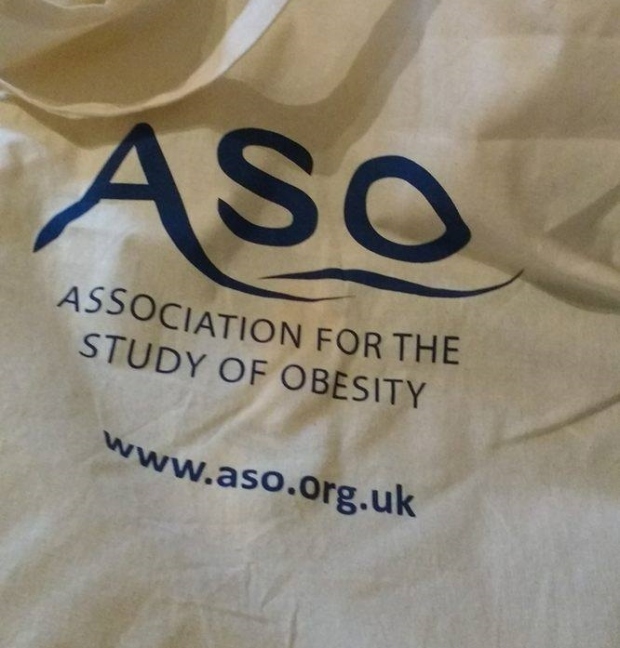
I love coming to conferences and listening to a variety of talks. I love getting to find out new areas of nutrition and science I didn’t know much about. I love seeing how scientific research develops and is presented. I love the interaction between all the delegates and the mixed opinions and questions that come out. I love finding new areas of interest and passion within nutrition. I love finding out about companies, charities or other groups where there are potential jobs and research areas for the future.
Last week I attended the Nutrition Society Student Conference held at the University of Chester.
I travelled up on the train and checked into my Travelodge room then filled my spare couple of hours exploring the city and sussing out where the Uni was ready for the next day.
First on the agenda was an informal pre conference meeting at a lovely pub in Chester. It was nice to meet some of the organisers and delegates of the conference before it started as I didn’t know anyone else attending at this point. (good food too!)
At arrival to the conference we were welcomed and given our delegate badges and packs. The first day mainly involved three lectures and then original communications sessions where students presented their research.
The keynote lecture was presented by Dr Louis Levy from Public Health England. He discussed public health nutrition. This was a great introduction and really informative due to the great experience Louis has in nutrition research, policy and health promotion. I attended a CV sessions with Louis later in the day and he had a lot of really helpful advice and has so much experience.
There was a variety of research presented in the original communication sessions from undergraduate to PhD level covering many different areas of nutrition. There was three types of presentation: posters, lightning presentations and the longest oral presentations. I really enjoyed these sessions. It widened my knowledge of the nutrition research that is being done. It made further study seem more accessible to me and less scary! Research areas included the Mediterranean diet, perceived liking of sugar leading to sugar intake and body composition, dietary intakes in Gaelic footballers, chewing gum and amount of breakfast consumed, dietary fibre intake, coeliac gluten free diets and chosen gluten free diets. These are just a few!
The first Plenary lectured by Dr Gary Mendoza discussed protein efficiency from the prospective of sports nutrition. He is a sports and exercise lecturer, health and leisure company owner, sports nutritionist with elite athletes and the general public and is registered with the Association for Nutrition. He talks from the prospective of food first rather than supplements. Simple milkshake drinks are great for post exercise. The second plenary lecture was by Dr Antonios Vlassopoulos from Nestle Research Centre. He talked about reformulating products and improving nutritional value. This was interesting as I didn’t know much about nutrition in industry before this. It has opened up the idea of industry more.
The first day of the conference was followed by the social function held at Chester Racecourse where we had a meal and talk from Stuart Armfield who is an Entrepreneur, motivational speaker and actor. His advice was to go with your gut! Work through the negative voices in your head and don’t give up.
The second day of the conference began with the second keynote lecture which was about nutritional issues in emerging countries by Professor Alan Jackson from the University of Southampton. This of course mentioned the double burden of nutrition: malnutrition and obesity.
The next session was a careers panel which had 12 panellists all with different careers. It was great to learn about such a variety of careers related to nutrition and find out the journeys to get to these. The panellists were great at answering questions presented to them from the audience. It was a very eye opening session and gave me a lot of information that I wouldn’t have gained without attending the conference. The careers ranged from Policy in the FDF to food developer at Kelloggs to University professors to Sports nutritionist to entrepreneur to dietician to nutritional biochemist to research and development to industry health and nutrition advisor to pet nutrition.
We then had a networking session led by the CEO of the Nutrition Society. Mark Hollingsworth introduced the session with a talk about his own experience of getting jobs and networking and then he went through his own approach to networking. The advice to self evaluate and create a list about yourself before networking to focus yourself was such a good idea that I will definitely use in the future. Hopefully networking will be slightly less daunting from now on. He finished with setting us a group activity in our tables. We had to find common interest between us and network without personal agenda. Our tables were led by the careers panellists and I was so lucky to have Liz Tucker and Dr Gary Mendoza on my table. We each gave a 30 seconds ish pitch and then they gave us general feedback and advice as they are so experienced! Positivity and learning from failure were definitely big points. I am very thankful for this experience.
The third plenary lecture was on reflection and continuing professional development by Dr Glenys Jones from the Association for Nutrition and Professor Basma Ellahi from the University of Chester. An important area for the future as we all develop professionally. Reflecting on what you have learnt, applying wat you have learnt and what you are going to do next is part of this. We were all given a sheet to fill in in order to reflect on the conference and I am currently reflecting whilst writing this blog. Plenary lecture four was Professor Tim Parr from the University of Nottingham who spoke about sustainability in animal nutrition. He is one of my lecturers and is always very engaging. He gave a very different topic to the conference from a lot of the other presentations making sure we got a balance of all types of nutrition. The final plenary lecture to end the conference was about nutrigenetics and nutritgenomics and possibilities for personalised nutrition by Dr Vimal Karani from the University of Reading. This was another very interesting topic and something I didn’t know much about beforehand.
I have learnt a lot from this experience. I have been exposed to many areas of nutrition and to many different nutrition careers and research. I’m very glad it was open to undergraduate students and it has given me a lot to think about!
We were told that in order for nutrition to develop and move forward and help start to solve nutritional problems we need strong nutritionist in all areas of public health, research and industry. The conference has given me a great background to begin my research project and career development in my final undergraduate year.
The organisers worked so hard to make a great conference and I’m looking forward to the next one already.